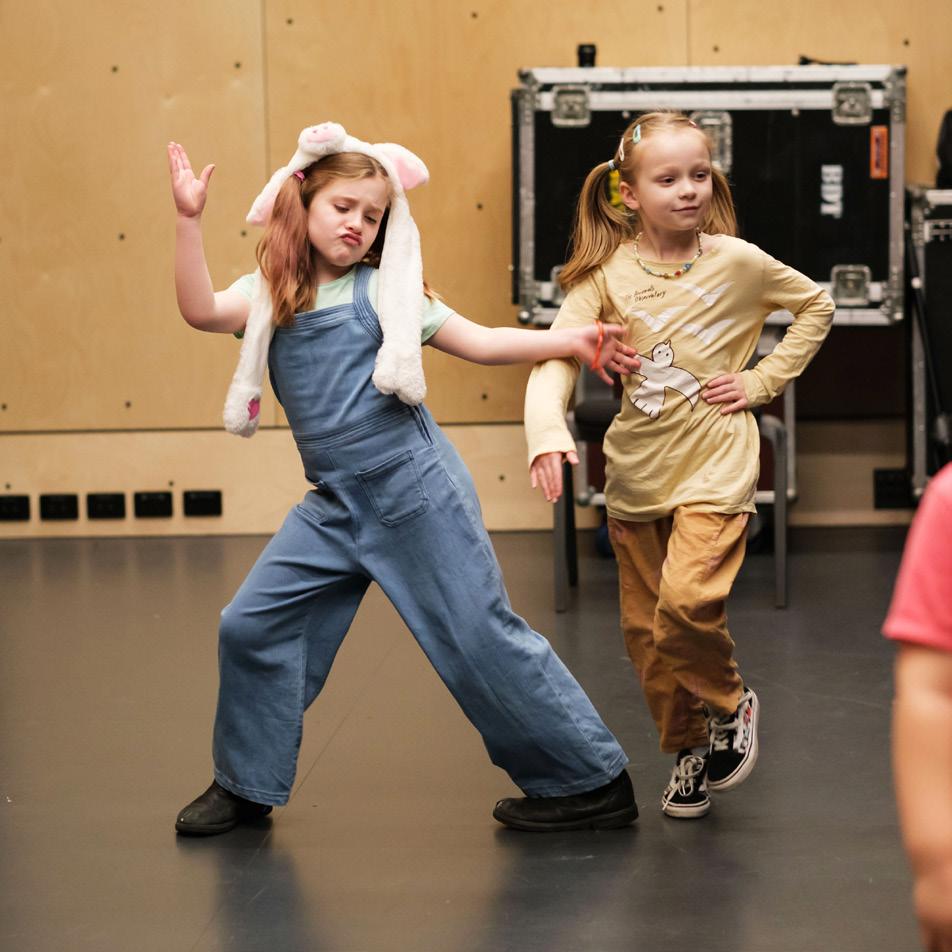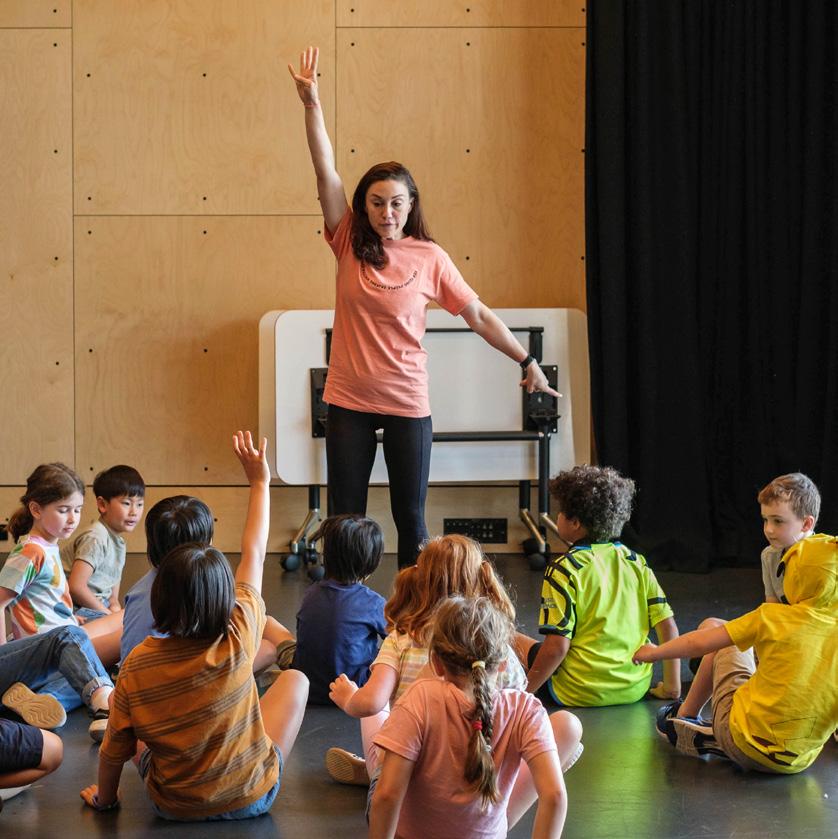Generator –Regional Engagement
Generator is a comprehensive professional development and mentoring initiative that connects regional teaching artists that have experience and skills in facilitating drama with young people so they may share ideas, experiences, resources and inspiration.
12 teaching artists from 7 locations across Regional NSW were invited to participate in a week-long professional development week in Sydney, before being supported to develop and deliver brand-new drama holiday programs for young people in their regional communities. With the support of the Department of Regional NSW, ATYP offers complete financial support to these programs, with the aim of developing effective and sustainable programs that can exist beyond the 18-month program.
“I feel ready to hit the ground running with creating workshops. I also feel I have made new friends and a happy drama circle and all the good vibes with the group! I also feel so grateful for the experience and equipped with new skills and extended old skills.”
– Sara Sinclair Generator participant 2023/24
Generator Participants 2023/24
1 Danielle Brame-Whiting Jopuka Productions (Central Coast)
2 Ben Mettam
O’Grady Drama Tamworth & New England (Tamworth)
3 Sara Sinclair
O’Grady Drama Tamworth & New England (Tamworth)
4 Ajita Canning
Understorey Youth Theatre (Evans Head)
5 Noa Rotem
Understorey Youth Theatre (Evans Head)
6 Sarah Martin Three Brothers Theatre Group (Camden Haven)
7 Matthew Fitz Three Brothers Theatre Group (Camden Haven)
8 Sally Jackson Freeroam Theatre (Wagga Wagga)
9 Jhi Reynor Freeroam Theatre (Wagga Wagga)
10 Clancy Hauser HotHouse Theatre (Albury)
11 Zajkel Zaia Freeroam Theatre (Wagga Wagga)
12 Mel Toscan Whoop Theatre (Griffith)
The program will run across 2023 and 2024.
Left: Photo by Clare Hawley
Australian Theatre for Young People and its Controlled Entity
Directors’ Report
For the Financial Year Ended 31 December 2023
The Directors present their report on the consolidated entity, consisting of Australian Theatre for Young People Limited (ATYP) and its controlled entity (the Group), for the year ended 31 December 2023 together with the financial statements and the Independent Audit Report thereon.
Directors’ details and meetings
The following persons were Directors of the Australian Theatre for Young People during or since the end of the financial year.
The number of meetings of Directors (including meetings of Committees of Directors) held during the year and the number of meetings attended by each Director is as follows:
F Corfield 26 May 2009 3 April 2023
S Hand 29 November 2021
J Harding 13 October 2023
T Hossain 16 April 2018 1 January 2023
J Lapworth 20 May 2012 27 February 2023
A Johnson 16 August 2021
G Larkins 12 August 2019 31 October 2023
M Morrissey 25 November 2019 1 January 2023
C Puplick 12 February 2018
D Selikowitz 12 August 2019 25
N Webb 12 August 2019
D Worthington 12 August 2019 30 October 2023
J Trifunovic 30 October 2023
A Number of meetings the director was entitled to attended.
B Number of meetings the director attended
Details of directors’ qualifications, experience and special responsibilities can be found on page 4 to 5 of this report.
Company secretary
Amanda Wright
Statement of purpose
Australian Theatre for Young People is the national youth theatre company. We exist to connect young people with the professional theatre industry – to share stories, build skills and create experiences that enhance our understanding of ourselves and the society to which we belong. It’s the principle that founded our company in 1963. It’s what drives us today.
Operating result
The consolidated comprehensive loss for the year amounted to $519,358 (2022 consolidated comprehensive loss: $1,100,492).
Australian Theatre for Young People and its Controlled Entity Directors’ Report
For the Financial Year Ended 31 December 2023
Review of operations
STRATEGIC GOALS 2020-2024
1. Be indisputably recognised nationally and globally as a leading theatre company that fearlessly champions young artists.
2. Deliver inclusive opportunities that connect young people with the professional theatre industry.
3. Be a leading advocate for youth arts and its’ social impact.
Principal activities for the year
The principal activities undertaken by ATYP to meet its 2023 goals included:
GOAL ONE: Be indisputably recognised nationally and globally as a leading theatre company that fearlessly champions young artists.
ATYP staged two fully professional productions involving young people in 2023. The Resistance, written and directed by Kip Chapman and presented n partnership with Auckland Theatre Company, and Cusp by Mary Anne Butler which opened in Sydney before conducting a small national tour culminating in a season at the Darwin Festival.
ATYP’s season of The Resistance was short-listed for a Sydney Theatre Award and commissions The Chapel, The Fire and The Dead Cat and Past the Shallows were both short-listed for Australian Writers Guild Industry Awards.
ATYP was invited to present Saplings, a new work by Hannah Belanszky developed with young people in conflict with the justice system, as part of the 2024 Sydney Festival.
GOAL TWO: Deliver inclusive opportunities that connect young people with the professional theatre industry.
ATYP delivered programs in partnership with leading national companies including Auckland Theatre Company, Black Swan State Theatre, Archipelago Productions, JUTE Theatre and the Darwin Festival.
ATYP delivered drama workshops, masterclasses and t eacher professional development through our thriving Workshops and Education programs;
ATYP successfully piloted the Cultivate program, a professional development initiative supporting dramaturgs from culturally and linguistically diverse backgrounds.
Following her completion of the 2023 Cultivate dramaturgy program, Ayah Tayeh was appointed by Belvoir as Producer, New Work. Ayah credits the Cultivate program with giving her the skills required to apply for and secure the job.
GOAL THREE: Be a leading advocate for youth arts and its’ social impact.
ATYP was approached by the Black Dog Institute to develop a performance outcome that could communicate suicide prevention strategies for teenagers and young adults. The resulting videos and resources were developed throughout 2023 under the title Social Circus Lab.
ATYP was approached by Youth Action, the peak body for young people in NSW, to develop a performance that could communicate the lived experience of young people in conflict with the Justice system. Development of the new work, Saplings by Hannah Belanszky, was attended by the Minister for Youth Justice, Jihad Dibb, with the production outcome supported by the Office for Regional Youth.
ATYP plays as a flagship Australian Youth Theatre company championing the youth arts sector was confirmed by Creative Australia through the awarding of four-year operational funding announced in December 2023.
Australian Theatre for Young People and its Controlled Entity
Directors’ Report
For the Financial Year Ended 31 December 2023
Directors’ qualifications and experience
Name and qualifications Experience and special responsibilities
Samara Hand BA/BLaw (UNSW), MA (UoL)
Samara is an Awabakal woman of Worimi and Biripi descent. Samara is the Learning and Programs Manager at the National Indigenous Youth Education Coalition and has experience in policy and program design and evaluation, government regulation and curriculum development focused on Indigenous Peoples. Samara is also completing her PhD in Law at UNSW on Indigenous Peoples' right to education. Samara was a Board Observer at ATYP in 2021.
Non-executive Director.
John Harding (VIC)
Currently completing his Doctorate of Philosophy (UoM) (Creative Arts)
John Harding (Kuku Yulangi/Erub; TSI) is the founder of Ilbijerri Aboriginal/TSI Theatre Company. An experienced playwright, director and actor, John has been awarded the Indigenous Fellowship by the Australia Council for the Arts (1997), the Australian Human Right Medal for Arts (1997), the ANU Nugget Coombes Fellowship (2002) and the Deadly Award for Literature (2009). John’s work has toured nationally and internationally to critical acclaim. Andrew Johnson BA, LLB, MSW
Executive Director of Thrive International, Andrew was the first NSW Advocate for Children and Young people, Andrew has lead NGOs both at the national and international level including ACOSS, Australian Republican Movement, Save the Children, ChildFund Alliance and chaired the NGO Committee on UNICEF.
Non-executive Director.
Chris Puplick AM BA Hons, MA (Syd)
Chair, Theatre and Music Theatre Board, Create NSW. Former President NSW Anti-Discrimination Board and Privacy Commissioner. Senior Member Commonwealth Administrative Appeals Tribunal (2019-2023). Former Chair, Griffin Theatre Company, NIDA and National Film and Sound Archive. Senator for NSW (1978-1981 and 1984-1990).
Chair and Non-executive Director
Julijana Trifunovic Director of Philanthropy at the Australian College of Nursing. Julijana is an Australian charity fundraiser with over 25 years of experience. An active Fundraising Institute of Australia (FIA) member for over 21 years, she has previously held various portfolios including Vice President of the NSW Chapter, Awards and Membership, National Conference Committee member and Professional Events Coordinator
Australian Theatre for Young People and its Controlled Entity Directors’ Report
For the Financial Year Ended 31 December 2023
Name and qualifications Experience and special responsibilities
Nicole Webb
BA Communications, PR & Media (UC)
An award-winning PR specialist, Nicole is the founder and CEO of The Impact Agency, with previously held PR and marketing roles at Universal Press, Profile Communications and the NSW State Government. Nicole is the current Chair of the PRIA Registered Consultancy Group.
Non-executive Director.
Contribution in winding up
The parent company is incorporated under the Corporations Act 2001 and is a company limited by guarantee. If the company is wound up, the constitution states that each member is required to contribute a maximum of $10 each towards meeting any outstanding obligations of the company. At 31 December 2023 the collective liability was $60 (2022: $110).
Significant changes in the state of affairs
In 2023 ATYP did not receive operational funding from the Federal Government through the Australia Council for the Arts, following a decision announced in 2020. This has left the company with very low levels of operational funding for 2023 and 2024. In response the company has cut investment in productions and will only stage works that have received appropriate levels of project funding.
Significant events after year end
There has not been any circumstance occurring subsequent to the end of the financial year that has significantly affected, or may significantly affect, the operations of the company, the results of those operations, or the state of affairs of the company in future financial years.
Likely developments and future results
Creative Australia (previously the Australia Council for the Arts) announced in December that ATYP will receive $250k per annum in operational funding from 2025 - 2028. While this offers stability to the company, it falls short of money required to maintain current company output. Strategies are being developed and implemented in 2023 to make up for the projected shortfall.
Environmental regulation
The consolidated entity is not subject to any particular or significant environmental regulation.
Indemnification and insurance of directors and officers
The company has paid insurance premiums in respect of directors’ and officers’ liability and legal expenses’ insurance contracts for current and former directors and officers, including senior executives of the company. The company has not otherwise indemnified or agreed to indemnify an officer or auditor of the company against a liability incurred by such an officer or auditor.
Australian Theatre for Young People and its Controlled Entity
Directors’ Report
For the Financial Year Ended 31 December 2023
Auditor’s independence declaration
A copy of the Auditor’s Independence Declaration as required under section 60-40 of the Australian Charities and Not-for-profits Commission Act 2012 is included in page 7 of this financial report.
Signed in accordance with a resolution of the directors.
Andrew Johnson Director
Australian Theatre for Young People and its Controlled Entity Auditor’s Independence Declaration to the Directors of Australian Theatre for Young People and its Controlled Entity For the Financial Year Ended 31 December 2023
In accordance with the requirements of section 60-40 of the Australian Charities and Not-for-profits Commission Act 2012, as lead auditor for the audit of Australian Theatre for Young People and its Controlled Entity for the year ended 31 December 2023, I declare that, to the best of my knowledge and belief, there have been:
a) No contraventions of the auditor independence requirements of the Australian Charities and Not-for-profits Commission Act 2012 in relation to the audit; and
b) No contraventions of any applicable code of professional conduct in relation to the audit.
SDJA
Simon Joyce Director
Australian Theatre for Young People and its Controlled Entity
Consolidated Statement of Changes in Equity For the Financial Year Ended 31 December 2023
Loss on revaluation of financial assets at FVOCI
Loss on revaluation of
Capital funds and
its long-term financial security.
Capitalcampaignreserve isareservewheredonationsreceivedtowardsATYP’snewhomeaspartofthePier2/3redevelopmentareearmarkeduntil required to meet the costs of the redevelopment.
Equitythrough fairvaluethroughothercomprehensiveincome(FVOCI)reserve comprisesgainsandlossesrelatingtoequityinvestmentsheldinATYP Foundation.
Australian Theatre for Young People and its Controlled Entity
Notes to the Consolidated Financial Statements
For the Financial Year Ended 31 December 2023
1. General information
The financial statements cover Australian Theatre for Young People (ATYP) and its only subsidiary, ATYP Foundation (collectively referred to as “the group”). ATYP is an entity limited by guarantee, incorporated and domiciled in Australia. The entity is a not-for-profit entity for financial reporting purposes under Australian Accounting Standards and a registered charity under the Australian Charities and Not-for-profits Commission Act 2012.
The group’s principal activity during the year is indicated on the directors’ report.
Principal place of business is Pier 2/3, Suite 2, 1 3A Hickson Road, Dawes Point, NSW 2000.
The financial report was authorised for issue by the directors on June 2024.
2. Changes in accounting policies
New and revised standards that are effective for these financial statements
A number of revised standards became effective for the first time to annual periods beginning on or after 1 July 2022. The adoption of these revised accounting standards has not had a material impact on the group’s financial statements.
Accounting Standards issued but not yet effective and not been adopted early by the group
A number of new and revised standards have been issued but are not yet effective and have not been adopted early by the group. The directors are currently assessing the impact such standard will have on the group.
3. Summary of material accounting policies
Financial reporting framework
The general purpose financial statements of the group have been prepared in accordance with the requirements of the Australian Charities and Not-for-profits Commission Act 2012 and the NSW Charitable Fundraising Act 1991.
Statement of compliance
The general purpose financial statements of the gro up have been prepared in accordance with Australian Accounting Standards – Simplified Disclosures and other authoritative pronouncements of the Australian Accounting Standards Board.
Basis of preparation
The financial statements, except for the cash flow information, have been prepared on an accruals basis and are based on historical costs unless otherwise stated in the notes. The material accounting policies that have been adopted in the preparation of this report are as follows:
Basis of consolidation
Subsidiaries are all entities over which the group has control. The group controls an entity where the group is exposed to, or has rights to, variable returns from its involvement with the entity and has the ability to affect those returns through its power to direct the activities of the entity. Subsidiaries are fully consolidated from the date on which control s transferred to the group. They are deconsolidated from the date that control ceases.
Australian Theatre for Young People and its Controlled Entity
Notes to the Consolidated Financial Statements
For the Financial Year Ended 31 December 2023
The acquisition method of accounting is used to account for business combinations by the group.
Inter-company transactions, balances and unrealised gains on transactions between group companies are eliminated.
Revenue from contracts with customers
Revenue is recognised on a basis that reflects the transfer of promised goods or services to customers at an amount that reflects the consideration the group expects to receive in exchange for those goods or services.
Revenue is recognised by applying a five-step model as follows:
1. Identify the contract with the customer
2. Identify the performance obligations
3. Determine the transaction price
4. Allocate the transaction price to the performance obligations
5. Recognise revenue as and when control of the performance obligations is transferred
Other revenue
For any revenue streams that are not defined as contracts with customers, revenue is recognised when the group gains control, economic benefits are probable and the amount of the revenue can be measured reliably.
All revenue is stated net of the amount of goods and services tax (GST).
Operating expenses
Operating expenses are recognised in profit or loss upon utilisation of the service or at the date of their origin.
Income tax
No provision for income tax has been raised as the group is exempt from income tax as a registered charity under the Australian Charities and Not-for-profits Commission Act 2012.
Cash and cash equivalents
Cash and cash equivalents include cash on hand, deposits held at-call with banks, other short-term highly liquid investments that are readily convertible to known amounts of cash and which are subject to an insignificant risk of changes in value.
Trade and other receivables
Trade receivables are initially recognised at fair value and subsequently measured at amortised cost using the effective interest method, less any allowance for expected losses. Trade receivables are generally due for settlement within 30 days.
Financial assets
Financial assets are initially recognised at fair value.
Financial assets at amortised cost
Financial assets at amortised cost are subsequently measured using the effective interest (EIR) method and are subject to impairment. Gains and losses are recognised in profit or loss when the asset is derecognised, modified or impaired.
Investments in equity instruments designated at fair value through other comprehensive income Upon initial recognition, the group can elect to classify irrevocably its equity investments as equity instruments designated at fair value through OCI when they meet the definition of equity under AASB132 Financial Instruments: Presentation and are not held for trading. The classification is determined on an instrument-by-instrument basis.
Gains and losses on these financial assets are neve r recycled to profit or loss. Dividends are recognised as other income in profit or loss when the right of payment has been established, except when the group benefits from such proceeds as a recovery of part of the cost of the financial asset, in which case, such gains are recorded in OCI. Equity instruments designated at fair value through OCI are not subject to impairment assessment.
Property, plant and equipment
Property, plant and equipment are measured using the cost model, cost less subsequent depreciation and impairment losses.
Depreciation
Property, plant and equipment, is depreciated on a straight-line basis over the asset’s useful life to the group, commencing when the asset is ready for use.
The useful lives used for each class of depreciable asset are shown below:
Fixed asset class Useful lives
Equipment and furniture 2 – 10 years
Leasehold improvements Over their useful lives
The assets’ residual values and useful lives are reviewed, and adjusted if appropriate, at the end of each reporting period.
Gains and losses on disposals are determined by comparing proceeds with the carrying amount. These gains or losses are included in the statement of profit or loss and other comprehensive income.
Intangible assets
Intangible assets acquired as part of a business combination, other than goodwill, are initially measured at their fair value at the date of the acquisition. Intangible assets acquired separately are initially recognised at cost.
Finite life intangibles assets
Finite life intangible assets are subsequently measured at cost less amortisation and any impairment. The method and useful lives of finite life intangible assets are reviewed annually.
The useful lives used for each class of amortised asset are shown below:
Intangible asset class Useful lives
Website and software 3 – 5 years
Impairment of assets
At the end of each reporting period the group determines whether there is evidence of an impairment indicator for non-financial assets.
Australian Theatre for Young People and its Controlled Entity
Notes to the Consolidated Financial Statements
For the Financial Year Ended 31 December 2023
Trade and other payables
These amounts represent liabilities for goods and services provided to the group prior to the end of the financial year and which are unpaid. Due to the short-term nature, they are measured at amortised cost and are not discounted. The amounts are unsecured and are usually paid within 30 days of recognition.
Goods and services tax (GST)
Revenue, expenses and assets are recognised net of the amount of goods and services tax (GST), except where the amount of GST incurred is not recoverable from the Australian Taxation Office (ATO).
Receivables and payables are stated inclusive of GST.
The net amount of GST recoverable from, or payable to, the ATO is included as part of receivables or payables in the statement of financial position.
Cash flows in the statement of cash flows are included on a gross basis and the GST component of cash flows arising from investing and financing activities which is recoverable from, or payable to, the taxation authority is classified as operating cash flows.
Provision for employee benefits
Provision is made for the group's liability for employee benefits arising from services rendered by employees to the end of the reporting period. Employee benefits that are expected to be wholly settled within one year have been measured at the amounts expected to be paid when the liability is settled.
In determining the liability, consideration is given to employee wage increases and the probability that the employee may satisfy vesting requirements. Cashflows are discounted using market yields on high quality corporate bond rates incorporating bonds rated AAA or AA by credit agencies, with terms to maturity that match the expected timing of cashflows. Changes in the measurement of the liability are recognised in profit or loss.
Leases
The group assesses at contract inception whether a contract is, or contains, a lease.
As a lessee
The group applies a single recognition and measurement approach for all leases, except for short-term leases and leases of low-value assets. The group recognises lease liabilities to make lease payments and right-of-use assets representing the right to use the underlying assets.
Right-of-use assets
The group recognises right-of-use assets at the commencement date of the lease (i.e., the date the underlying asset is available for use). Right-of-use assets are measured at cost, less any accumulated depreciation and impairment losses, and adjusted for any remeasurement of lease liabilities. The cost of right-of-use assets includes the amount of lease liabilities recognised, initial direct costs incurred, and lease payments made at or before the commencement date less any lease incentives received.
Australian Theatre for Young People and its Controlled Entity
Notes to the Consolidated Financial Statements
For the Financial Year Ended 31 December 2023
Right-of-use assets are depreciated on a straight-line basis over the shorter of the lease term and the estimated useful lives of the assets, as follows:
The right-of-use assets are also subject to impairment.
Lease liabilities
At the commencement date of the lease, the group recognises lease liabilities measured at the present value of lease payments to be made over the lease term.
Liabilities relating to contracts with customers
Contract liabilities
A contract liability is recognised if a payment is received or a payment is due (whichever is earlier) from a customer before the group transfers the related goods or services/grant conditions are fulfilled. Contract liabilities include deferred income. Contract liabilities are recognised as revenue when the group performs under the contract (i.e., transfers control of the related goods or services to the customer/fulfils conditions of the grant).
The services are usually provided/conditions usually fulfilled within twelve (12) months of receipt of the payment/grant. Where the amount received is in respect of services to be provided over a period that exceeds twelve (12) months after the reporting date/the conditions will only be satisfied more than twelve (12) months after the reporting date, t he liability is discounted and presented as noncurrent.
Comparative figures
Where required by Accounting Standards, comparative figures have been adjusted to conform to changes in presentation for the current financial year. With the exception of minor reclassifications between certain financial statement line items, comparatives are consistent with prior years, unless otherwise stated.
Significant management judgement in applying accounting policies
When preparing the financial statements, Board of Directors undertakes a number of judgements, estimates and assumptions about the recognition and measurement of assets, liabilities, income and expenses.
Estimation uncertainty
Information about estimates and assumptions that have the most significant effect on recognition and measurement of assets, liabilities, income and expenses is provided below. Actual results may be substantially different.
Receivables
The receivables at reporting date have been reviewed to determine whether there is any objective evidence that any of the receivables are impaired. An allowance for expected losses is included, where applicable, based on historical credit loss experience, adjusted for forward-looking factors specific to the debtors and the economic environment. The allowance for expected losses is based on the best information at the reporting date.
Australian Theatre for Young People and its Controlled Entity
Notes to the Consolidated Financial Statements
For the Financial Year Ended 31 December 2023
Useful lives of depreciable assets
The Board of Directors review its estimate of the useful lives of depreciable assets at each reporting date, based on the expected utility of the assets. Uncertainties in these estimates relate to technica obsolescence that may change the utility of certain depreciable assets.
Long service leave
The liability for long service leave is recognised and measured at the present value of the estimated cash flows to be made in respect of all employees at the reporting date. In determining the present value of the liability, estimates of attrition rates and pay increases through promotion and inflation have been taken into account.
If conditions are attached to a grant, revenue is recognised when the entity satisfies those conditions.
Revenuerelatingtoworkshop,performanceandresourceisrecognisedovertheperiodinwhichtheserviceis provided.
Saleofgoodsarerecognisedatthepointofsale,whichiswherethecustomerhastakendeliveryofthegoods, the risks and rewards are transferred to the customer.
12. Right-of-use assets
Right-of-use assets (continued)
TheentityleasespremisesatPier2/3,13AHicksonRoad,DawesPoint,NSW.Leasetermisforperiodof10 yearsending16January2032,withanoptiontorenewforfurther10years.Paymentsaremademonthlyand are subject to annual review based on a fixed percentage of 5%.
TheleaseissubjecttoaTenantWorksContributionof$1,000,000overthe10-yearleaseterm.Duringtheyear, theentitywasnotliabletopaythe$100,000andismeetingwithNSWStateGovernmenttodiscusstheongoing treatment of payments in relation to this.
17. Other liabilities
Australian Theatre for Young People and its Controlled Entity
Notes to the Consolidated Financial Statements For the
20. NSW Charitable Fundraising Act 1991 (continued)
a) Details of aggregated gross income and total expenses from fundraising appeals (continued)
b) Nature of fundraising appeals and application of net surplus
Fundraisingappealsprimarilyconsistedofdonations.Thenetsurplusgeneratedfromfundraisingactivitieswas applied to the charitable purposes of the organisation.
21. Related parties
Thegroup’srelatedpartiesincludeitskeymanagementpersonnelandrelatedentities.Transactionsbetween relatedpartiesareonnormalcommercialtermsandconditionsnomorefavourablethanthoseavailableto other parties.
Thedirectorsactinanhonorarycapacityandreceivenocompensationfortheirservices,otherthanFraser Corfield who is the Artistic Director of ATYP.
Thetotalamountofdonationsreceivedfromdirectorsduringtheyearended31December2023amountedto $747 (2022: $6,020).
Remuneration of auditors
J Miller & Co
Australian Theatre for Young People and its Controlled Entity
Notes to the Consolidated Financial Statements
For the Financial Year Ended 31 December 2023
Theparentcompanyisincorporatedunderthe CorporationsAct2001 andisanentitylimitedbyguarantee.If theentityiswoundup,theConstitutionstatesthateachmemberisrequiredtocontributeamaximum$10each towardsmeetinganyoutstandingobligationsoftheentity.At31December2023,thetotalamountthat members of the entity are liable to contribute if the entity is wound up is $60 (2022: $110).
ThegroupisdependentupontheongoingreceiptofFederalandStateGovernmentgrantssponsorshipincome, workshopsfeesandattendances,anddonations,toensuretheongoingcontinuanceofitsprograms.Atthe dateofthisreport,directorshavenoreasontobelievethatthisfinancialsupportwillnotcontinuetotheextent required to continue operating as a going concern.
The group had no material unrecognised contractual commitments as at 31 December 2023.
26. Contingent liabilities
There are no contingent liabilities as at 31 December 2023.
27. Subsequent events
Noadjustingorsignificantnon-adjustingeventshaveoccurredbetweenthereportingdateandthedateof authorisation of these accounts.
23. Members' guarantee
24. Economic dependence
25. Commitments
Australian Theatre for Young People and its Controlled Entity
Responsible Persons’ Declaration
For the Financial Year Ended 31 December 2023
The Responsible Persons declare that in the Responsible Persons’ opinion:
a) the consolidated financial statements and notes are in accordance with the Australian Charities and Not-for-profits Commission Act 2012, including:
i) giving a true and fair view of the group’s financia position as at 31 December 2023 and of its performance for the year ended on that date; and
ii) complying with Australian Accounting Standards – Simplified Disclosures and the Australian Charities and Not-for-profits Commission Regulations 2022; and
b) there are reasonable grounds to believe that the group is able to pay all of its debts, as and when they become due and payable.
Signed in accordance with subsection 60.15(2) of the Australian Charities and Not-for-profits Commission Regulations 2022
June 2024
Australian Theatre for Young People and its Controlled Entity
Responsible Persons’ Declaration under the NSW Charitable Fundraising Act 1991 For the Financial Year Ended 31 December 2023
The Responsible Persons declare that in the Responsible Persons’ opinion:
a) the consolidated statement of profit or loss and other comprehensive income and associated notes gives a true and fair view of all income and expenditure of the organisation with respect to fundraising appeals for the financial year ended 31 December 2023;
b) the consolidated statement of financial position and associated notes gives a true and fair view of the state of affairs of the organisation with respect to fundraising appeals conducted by the organisation as at 31 December 2023;
c) the provisions of the NSW Charitable Fundraising Act 1991 and Regulations and the conditions attached to the authority have been complied with during the financial year ended 31 December 2023; and
d) the internal controls exercised by the organisation are appropriate and effective in accounting for all income received and applied by the organisation from any of its fundraising appeals during the financial year ended 31 December 2023.
Andrew Johnson Director
Andrew Johnson Director June 2024
ABN: 11 624 245 334
P: PO Box 324
West Pennant Hills NSW 2125
M: 0428 074 081
E: info@sdja.com.au
W: www.sdja.com.au
Australian Theatre for Young People and its Controlled Entity Independent Auditor’s Report to the Members of Australian Theatre for Young People and its Controlled Entity For the Financial Year Ended 31 December 2023
Opinion
We have audited the financial report of Australian Theatre for Young People and its Controlled Entity (the group), which comprises the consolidated statement of financial position as at 31 December 2023, the consolidated statement of profit or loss and other comprehensive income, consolidated statement of changes in equity and consolidated statement of cash flows for the year then ended, notes to the consolidated financial statements, including a summary of material accounting policies, and the responsible persons’ declaration.
In our opinion, the financial report of Australian Theatre for Young People and its Controlled Entity has been prepared in accordance with Division 60 of the Australian Charities and Not-for-profits Commission Act 2012 (ACNC Act), including:
(a) giving a true and fair view of the group’s financial position as at 31 December 2023 and of its financial performance for the year then ended; and
(b) complying with Australian Accounting Standards – Simplified Disclosures and Division 60 of the Australian Charities and Not-for-profits Commission Regulations 2022
Basis for Opinion
We conducted our audit in accordance with Australian Auditing Standards. Our responsibilities under those standards are further described in the Auditor’s Responsibilities for the Audit of the Financial Report section of our report. We are independent of the group in accordance with the ethical requirements of the Accounting Professional and Ethical Standards Board’s APES 110 Code of Ethics for Professional Accountants (the Code) that are relevant to our audit of the consolidated financial report in Australia. We have also fulfilled our other ethical responsibilities in accordance with the Code.
We believe that the audit evidence we have obtained is sufficient and appropriate to provide a basis for our opinion.
Information Other than the Financial Report and Auditor’s Report Thereon
The directors are responsible for the other information. The other information is the directors’ report accompanying the consolidated financial report.
Our opinion on the consolidated financial report does not cover the other information and accordingly we do not express any form of assurance conclusion thereon.
In connection with our audit of the consolidated financial report, our responsibility is to read the other information and, in doing so, consider whether the other information is materially inconsistent with the consolidated financial report or our knowledge obtained in the audit or otherwise appears to be materially misstated.
Liability limited by a scheme approved under Professional Standards Legislation
Australian Theatre for Young People and its Controlled Entity
Independent Auditor’s Report to the Members of Australian Theatre for Young People and its Controlled Entity
For the Financial Year Ended 31 December 2023
If, based on the work we have performed, we conclude that there is a material misstatement of this other information, we are required to report that fact. We have nothing to report in this regard.
Responsibilities
of Responsible Persons for the Financial Report
The responsible persons of the group are responsible for the preparation and fair presentation of the consolidated financial report in accordance with Australian Accounting Standards and the ACNC Act, and for such internal control as the responsible pe rsons determine is necessary to enable the preparation of the consolidated financial report that is free from material misstatement, whether due to fraud or error.
In preparing the consolidated financial report, responsible persons are responsible for assessing the group’s ability to continue as a going concern, disclosing, as applicable, matters related to going concern and using the going concern basis of accounting unless the responsible persons either intend to liquidate the group or to cease operations or have no realistic alternative but to do so.
The responsible persons are responsible for overseeing the group’s financial reporting process.
Auditor’s Responsibilities for the Audit of the Financial Report
Our objectives are to obtain reasonable assurance about whether the financial report as a whole is free from material misstatement, whether due to fraud or error, and to issue an auditor’s report that includes our opinion. Reasonable assurance is a high level of assurance, but is not a guarantee that an audit conducted in accordance with Australian Auditing Standards will always detect a material misstatement when it exists. Misstatements can arise from fraud or error and are considered material if, individually or in the aggregate, they could reasonably be expected to influence the economic decisions of users taken on the basis of the financial report.
A further description of our responsibilities for audit of the financial report is located at the Auditing and Assurance Standards Board website at: http://www.auasb.gov.au/. This description forms part of our auditor’s report.
Report of the requirements of the NSW Charitable Fundraising Act 1991
We have audited the consolidated financial report as required by Section 24(2) of the NSW Charitable Fundraising Act 1991. Our procedures included obtaining an understanding of the internal control structure for fundraising appeal activities and examination, on a test basis, of evidence supporting compliance with the accounting and associated record keeping requirements for fundraising appeal activities pursuant to the NSW Charitable Fundraising Act 1991 and the NSW Charitable Fundraising Regulation 2021.
Because of the inherent limitations of any assurance engagement, it is possible that fraud, error or non-compliance may occur and not be detected. An audit is not designed to detect all instance of noncompliance with the requirements described in the above-mentioned Acts and Regulations as an audit is not performed continuously throughout the period and the audit procedures performed in respect of compliance with these requirements are undertaken on a test basis. The audit report expressed in this report has been formed on the above basis.
Australian Theatre for Young People and its Controlled Entity
Independent Auditor’s Report to the Members of Australian Theatre for Young People and its Controlled Entity
For the Financial Year Ended 31 December 2023
Opinion
In our opinion:
a) the consolidated financial report of Australian Theatre for Young People and its Controlled Entity has been properly drawn up and associated records have been properly kept during the financial year ended 31 December 2023, in all material respects, in accordance with:
i) sections 20(1), 22(1-2), 24(1-3) of the NSW Charitable Fundraising Act 1991; and
ii) sections 10(6) and 11 of the NSW Charitable Fundraising Regulation 2021
b) the money received as a result of fundraising appeals conducted by the group during the financial year ended 31 December 2023 has been properly accounted for and applied, in all material respects, in accordance with the above-mentioned Act and Regulations.
Simon Joyce Director
SDJA




































